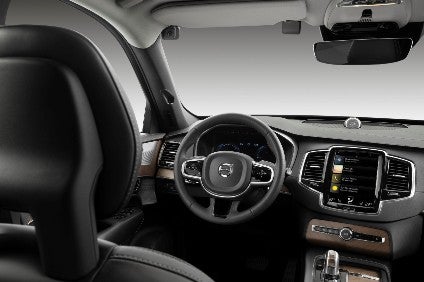
Geely's Volvo Cars has revealed a new step in its ambitions to end fatalities in its cars by addressing the issues of intoxication and distraction.
Apart from speeding, which the company aims to help combat with a top speed limit, intoxication and distraction are two other primary areas of concern for traffic safety. Together, these three areas constitute the main 'gaps' towards the automaker's vision of a future with zero traffic fatalities, and require a focus on human behaviour in the company's safety work as well.

Discover B2B Marketing That Performs
Combine business intelligence and editorial excellence to reach engaged professionals across 36 leading media platforms.
NHTSA data shows that in the US, almost 30% of all traffic fatalities in vehicles in 2017 involved intoxicated drivers.
Volvo believes intoxication and distraction should be addressed by installing in-car cameras and other sensors that monitor the driver and allow the car to intervene if a clearly intoxicated or distracted driver does not respond to warning signals and is risking an accident involving serious injury or death.
That intervention could involve limiting the car's speed, alerting the Volvo On Call assistance service and, as a final course of action, actively slowing down and safely parking the car.
"When it comes to safety, our aim is to avoid accidents altogether rather than limit the impact when an accident is imminent and unavoidable," said R&D chief Henrik Green.
"In this case, cameras will monitor for behaviour that may lead to serious injury or death."
Examples of such behaviour include a complete lack of steering input for extended periods of time, drivers who are detected to have their eyes closed or off the road for extended periods of time, as well as extreme weaving across lanes or excessively slow reaction times.
A driver-monitoring system is an important element of allowing the car to actively make decisions in order to help avoid accidents that could result in severe injuries or death.
"There are many accidents that occur as a result of intoxicated drivers," said Trent Victor, professor of driver behaviour at the automaker.
"Some people still believe that they can drive after having had a drink, and that this will not affect their capabilities. We want to ensure that people are not put in danger as a result of intoxication."
Introduction of the cameras on all models will start on the next generation of the scalable SPA2 vehicle platform in the early 2020s.
The automaker previously said it was limiting the top speed on all its cars to 180km/h (112mph) from model year 2021 in order to send a strong signal about the dangers of speeding.
Volvo said it wants to start a conversation about whether car makers have the right, or maybe even the obligation, to install technology in cars that changes their drivers' behaviour. Both the speed limit and the installation of in-car cameras illustrate how car makers can take active responsibility for the aim of achieving zero traffic fatalities by supporting better driver behaviour.






